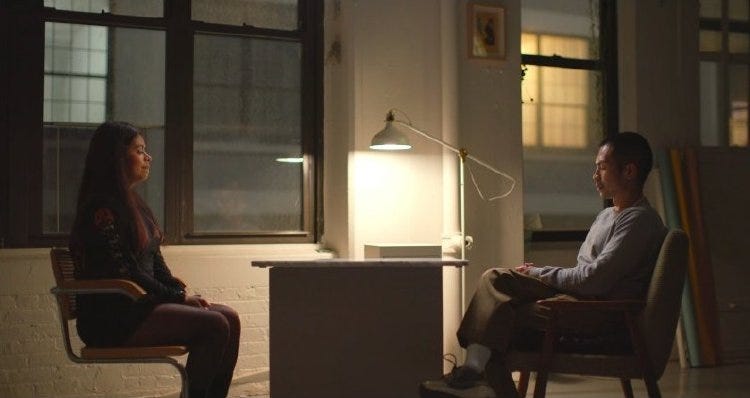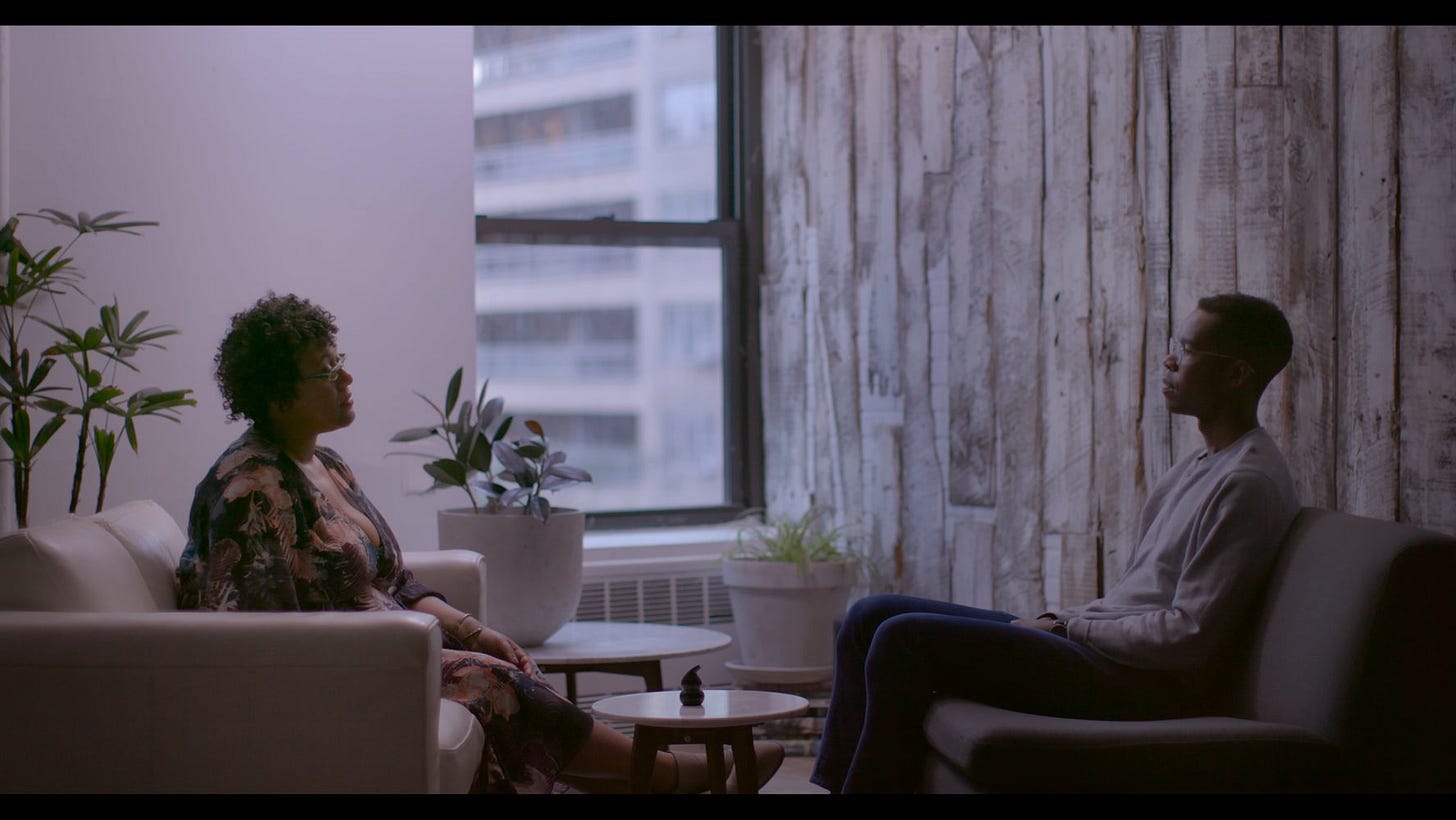Look Into My Eyes (2024)
Seven New York City psychics lead us on a journey through life's inner mysteries
Client and psychic in search of elusive insights quietly tread the path between them
Look Into My Eyes (2024)
In theaters
What is a psychic? From what we witness in this film, it’s an unapologetic “seer” who probes a client’s innermost consciousness. The psychic gets there using what Eastern thought and Western philosophers since Nietzsche have called “the third eye.”
That faculty, or gift, is what this soft-spoken real-life account investigates, the inner life, where documentaries rarely venture. It’s set in present-day New York City and focuses on seven practicing psychics who’ve plied their trade for years.
Most, though not all, charge clients for what they describe as professional services. They all acknowledge that they’re offering insights simply by trusting their instincts. They fully realize that cynics may wonder if they’re making stuff up.
In practice, that’s not so easy to say. You enter this realm under certain ground rules. Psychics dive into those interior states of longing and remembrance that troubled clients struggle to find words for.
The movie invites us to sit in on their intensely private one-to-one exchanges and in effect bolts the door behind us, refusing to let us leave. The “rational” world is ordered out, told to mind its own business.
These exchanges can mimic therapy, but a touch of the mystical underpins them. Psychics live and move in the emotional margins. Many are frustrated artists who transform intense habits of listening into a form of outreach and expression.
Working out of their apartments, some homily cluttered, others tastefully elegant, these laid-back clairvoyants operate in different styles and take on a variety of clients. Director Lana Wilson films the psychics and those they seek to help in still, quiet rooms, shot close up with minimal visual flourishes.
The sharp, deep-toned cinematography is brightly colored but rarely “moody”. These are real people, psychics and clients, stepping out of the mainstream to tease out the inexplicable. There’s no narration or musical score. Those additions would introduce static. Psychic interaction relies on undisturbed vibes.
The clients, of varying ages, are all puzzled by feelings they can’t understand or memories they can’t lay to rest.
We listen to a handsome woman doctor, aged 50, haunted by a memory from 20 years before of a young patient who died perhaps due to the bone-tired doctor’s wavering attention.
“How is she?” the doctor wants to know. We’re stunned by the question, and this sort of jolt is one way the movie hooks us. An objective medical professional can’t get past the imponderable and wonders how her long dead patient “is”.
A psychic guides a client to understanding a connection to his enslaved grandfather
Painful enigmas like this are common. A Black woman psychic tries to help a young Black man grappling with the fact that his grandfather was a slave.
His grandfather was sold for $250, and the young man can’t get past the trauma of that number. The psychic assures him his grandfather wants him to live free, that 250 could represent the multiple opportunities open to his grandson. The young man quietly weeps.
Trifles can also ring true. Another psychic says he’s getting a quite specific feeling from a client about shrimp. Voilà. Shrimp is the client’s favorite food, and he once happily accepted a dare where he had to eat them daily for a year.
The psychic, now on a roll, zeroes in on the word “tutu”. Bingo. The client’s daughter’s favorite book, a ballet story he repeatedly reads to her, has that very word in its title.
A young woman needs to know if her birth mother in China who gave her up still thinks of her. Adopted as a child by white parents, she wants to deepen her connection to her Chinese heritage, but, poignantly, seeks her birth mother’s approval to move forward.
Candidly, the psychic reports no clear signal, but also sees no obstacle in the woman’s path to self-discovery.
There are lighter transactions, like the one where an elderly woman has a question about her cheerful, outgoing dog. When they’re out walking together, her pet eagerly leaps up to touch and be petted by strangers.
But does he love her just as much? Yes, she’s assured; it’s merely that her dog wants her to reach out to strangers, too. The relieved woman’s smile, acknowledging she’d wondered all along if that’s what was going on, is priceless.
These exchanges can mimic therapy, but a touch of the mystical underpins them. Psychics live and move in the emotional margins. Many are frustrated artists who transform intense habits of listening into a form of outreach and expression.
Some come from established belief systems, others from no spiritual tradition at all. They often couldn’t fully embrace their gifts until they were into their 30s, and also needed to amplify them with reading and coursework.
But can they really hear from the dead and summon absent people or forces? It’s important to respect what they actually claim as opposed to what they’d never propose they can do.
For one thing, these sessions aren’t séances. No psychic here claims to evoke the actual presence of any other person. Psychics are mediums who “feel” the other, “hear” them and put their pleas into healing words.
Vitally, those are the psychic’s words. No direct communication is ever suggested.
But, as one psychic asks, does it matter if it’s “only” the psychic’s imagination at work? How far apart are imagination and the actual anyway? If the client feels the connection, it’s happened, it’s real.
We also see psychic ventures that don’t pan out. When one psychic and client meet, they discover, to their surprise, that years before they’d been close friends with the same person. But with multiple attempts the psychic can’t hear the mutual friend’s voice or deduce his thoughts.
Psychics here sadly acknowledge that they’re sometimes “blocked” from insights. Past abuse they’ve suffered, childhood trauma they can’t shake, or knotty career choices can get in their way. Should I be an actor or a psychic, one practitioner asked himself for years before settling on mind exploration.
Others paint pictures, compose or play music, design apartment interiors or clothing. They all seek outlets for a kind of voracious energy they have trouble wrangling. Their clients often open up pathways for the psychics to trace their own wounds and scars.
Look Into My Eyes isn’t going to persuade you that psychic claims are genuine, or even worth pursuing for yourself. But it’s not looking to convert you to a believer. It only wants you to question what you sometimes sense and can’t explain. Where exactly is that happening?
We sometimes hear director Wilson asking a question, but she’s never on camera. Her cinematographer Stephen Maing shoots in crisp, unadorned interview style, letting the swift passage of two- or three-second cuts build wonder in our minds. It’s all warmly lit, so the questions and the invitation remain open.






A very nice respectful review. Thank you. One thing: I think it's important to make the distinction between a psychic and a medium. As a New York psychic, I prefer to deal with a client's issues in this life only, like a psychic therapist - rather than hearing messages from dead relatives. I do hear messages from my guide with great accuracy including names and all sorts of specifics. It's very rewarding! But I choose to deal with helping a client with their current issues in their current life.